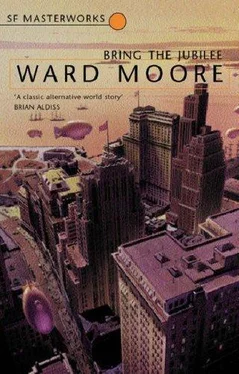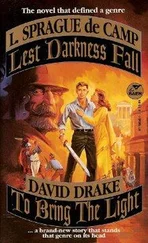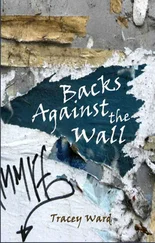The rider swerved, and he, too, twisted around me as though I were the post at the far turn of a racecourse. Reflexively I put out my hand to grab at the reins and stop the assault. Indeed, my fingers actually touched the leather and grasped it for a fraction of a second before they fell away.
Then I was alone in the road again as both pursued and pursuer vaulted back over the fence. The whole scene of anger and terror could not have lasted two minutes; I strained my ears to hear the shouts coming from farther and farther away. Quiet fell again; a squirrel flirted his tail and sped down one tree trunk and up another. The episode might never have happened.
I shifted my bundle back and began walking again—less briskly now. My legs felt heavy, and there was an involuntary twitch in the muscles of my arm.
Why hadn't I held onto the reins and delayed the hunter, at least long enough to give his quarry a fair start? What had made me draw back? It had not been fear, at least in the usual sense, for I knew I wasn't timorous of the horseman. I was sure I could have dragged him down if he had taken his quirt to me.
Yet I had been afraid. Afraid of interfering, of meddling in affairs which were no concern of mine, of risking action on quick judgment. I had been immobilized by the fear of asserting my sympathies, my presumptions, against events.
Walking slowly down the road, I experienced deep shame. I might, I could have saved someone from hurt; I had perhaps had the power for a brief instant to change the course of a whole life. I had been guilty of a cowardice far worse than mere fear for my skin. I could have wept with mortification—done anything, in fact, but turn back and try to rectify my failure.
The rest of the day was gloomy as I alternately taunted and feebly excused myself. The fugitive might have been a trespasser or a servant; his fault might have been slowness, rudeness, theft, or attempted murder. Whatever it was, any retaliation the white man chose could be inflicted with impunity. He would not be punished or even tried for it. Popular opinion was unanimous for Negro emigration to Africa, voluntary or forced; those who went westward to join the unconquered Sioux or Nez Perc were looked upon as depraved. Any Negro who didn't embark for Liberia or Sierra Leone, regardless of whether he had the fare or not, deserved anything that happened to him in the United States.
It was because I held, somewhat vaguely, a stubborn refusal to accept this conventional view, a refusal never precisely reasoned and little more, perhaps, than romantic rebellion against my mother in favor of my disreputable grandfather Backmaker, that I suffered. I couldn't excuse my failure on the grounds that action would have been considered outrageous. It would not have been considered outrageous by me.
I pushed self-contempt at my passivity aside as best I could and strove to recapture the mood of yesterday, succeeding to some extent as the memory of the scene came back less insistently. I even tried pretending the episode had perhaps not been quite as serious as it seemed, or that the pursued had somehow in the end evaded the pursuer. I could not make what had happened not happen; the best I could do was minimize my culpability.
That night I slept a little way from the road and in the morning started off at dawn. Although I was now little more than twenty miles from the metropolis the character of the country had hardly changed. Perhaps the farms were smaller and closer together, their juxtaposition to the estates more incongruous. But traffic was continual now, with no empty stretches on the roads, and the small towns had horse-drawn cars running on iron tracks embedded in the cobbles.
It was late afternoon when I crossed Spuyten Duyvil Creek to Manhattan. Between me and the city now lay a wilderness of squatters' shacks made of old boards, barrel staves, and other discarded rubbish. Lean goats and mangy cats nosed through rubble heaps of broken glass and earthenware demijohns. Mounds of garbage lay beside aimless creeks struggling blindly for the rivers. As clearly as though it had been proclaimed on signposts this was an area of outcasts and fugitives, of men and women ignored and tolerated by the law so long as they kept within the confines of their horrible slum.
Strange and repugnant as the place was, I hesitated to keep on going and arrive in the city at nightfall, but it seemed unlikely there was a place to sleep among the shacks. Once away from the order and sobriety of the post road one could be lost in the squalid maze; undefined threats of vaguely dreadful fates seemed to rise from it like vapors.
Then the fading light revealed the anomaly of a venerable mansion set far back from the highway, with grounds as yet unusurped by the encroaching stews. The house was in ruins; the surrounding gardens lost in brush and weeds. Evidently a watchman or caretaker guarded its forlorn dignity or had very recently abandoned it; I could not imagine its remaining long without being entirely overrun otherwise.
It was almost fully dark as I made my way cautiously toward the remains of an old summerhouse. Its roof was fallen in, and it was densely enclosed by ancient rosebushes whose thorns, I thought, when they pricked my fingers as I struggled through them, ought to give warning of any intruder. For weatherworthiness this shelter had little advantage over the hovels, yet somehow the fact that it had survived seemed to make it a more secure retreat.
I stretched out on the dank boards and slept fitfully, disturbed by dreams that the old mansion was filled with people from a past time who begged me to save them from the slum dwellers and their house from being further ravaged. Brokenly I protested I was helpless—in true dream manner I then became helpless, unable to move—that I could not interfere with what had to happen; they moaned and wrung their hands and faded away. Still, I slept, and in the morning the cramps in my muscles and the aches in my bones disappeared in the excitement of the remaining miles to the city.
And how suddenly it grew up around me, not as though it was a fixed collection of buildings which I approached, but as if I stood still while the wood and stone, iron and brick, sprang into being all about.
New York, in 1938, had a population of nearly a million, having grown very slowly since the close of the War of Southron Independence. Together with the half million in the city of Brooklyn this represented by far the largest concentration of people in the United States, though of course it could not compare with the great Confederate centers of Washington, now including Baltimore and Alexandria, St. Louis, or Leesburg (once Mexico City).
The change from the country and the dreadful slums through which I had passed was startling. Cablecars whizzed northward as far as Fifty-ninth Street on the west side and all the way to Eighty-seventh on the east, while horse cars furnished convenient crosstown transportation every few blocks. Express steam trains ran through bridged cuts on Madison Avenue, an engineering achievement of which New Yorkers were vastly proud.
Bicycles, rare around Wappinger Falls, were thick as flies, darting ahead and alongside dray horses pulling wallowing vans, carts, or wagons. Prancing trotters drew private carriages, buggies, broughams, victorias, hansoms, dogcarts or sulkies; neither the cyclists, coachmen, nor horses seemed overawed or discommoded by occasional minibiles chuffing their way swiftly and implacably over cobblestones or asphalt.
Incredibly intricate traceries of telegraph wires swarmed overhead, crossing and recrossing at all angles, slanting upward into offices and flats or downward to stores, a reminder that no urban family with pretensions to gentility would be without the clacking instrument in the parlor, that every child learned the Morse code before he could read. Thousands of sparrows considered the wires properly their own; they perched and swung, quarreled and scolded on them, leaving only to satisfy their voracity upon the steaming mounds of horse dung below.
Читать дальше












